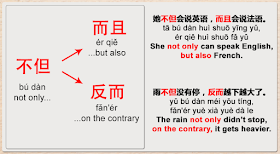不但 (bú dàn) is widely used in Chinese complex sentences to indicate "not only".
The most common sentence pattern is as follows:
Subject + 不但 (bú dàn) + Verb (Adjective), 而且 (ér qiě) + Verb (Adjective)
If there is only one subject, then it is placed at the beginning of the sentence (the subject should precede 不但 and 而且). If there are two subjects, they are put after 不但 and 而且.
There is only one subject in this sentence, so in this case 她 precedes 不但.
她不但会唱歌, 而且会跳舞。
tā bú dàn huì chàng gē, ér qiě huì tiào wǔ.
Not only can she sing, but she can also dance.
This is an example of an incorrect sentence:
不但她会唱歌, 而且会跳舞。
bú dàn tā huì chàng gē, ér qiě huì tiào wǔ.
In the following sentence, there are two different subjects, so 不但 precedes 我 in the first clause, and 而且 precedes 我女朋友 in the second clause:
不但我喜欢吃苹果, 而且我女朋友也喜欢。
bú dàn wǒ xǐ huān chī ping guǒ, ér qiě wǒ nǚ péng yǒu yě xǐ huān
Not only I like to eat apples, but my girl friend likes, too.
It is wrong to say:
我不但喜欢吃苹果,我女朋友而且也喜欢。
wǒ bú dàn xǐ huān chī ping guǒ, wǒ nǚ péng yǒu ér qiě yě xǐ huān
还 (hái) or 也 (yě) may be used instead of the omitted 而且.
我不但喜欢吃还喜欢做菜。
wǒ bú dàn xǐhuān chī hái xǐhuān zuò cài
I not only like to eat, but I also like to cook.
Using 反而 in the second clause slightly changes the meaning:
他不但不伤心, 反而显得很高兴。
tā bú dàn bù shāngxīn, fǎn'ér xiǎndé hěn gāoxìng
He is not sad; on the contrary, he looks happy.
The most common sentence pattern is as follows:
Subject + 不但 (bú dàn) + Verb (Adjective), 而且 (ér qiě) + Verb (Adjective)
If there is only one subject, then it is placed at the beginning of the sentence (the subject should precede 不但 and 而且). If there are two subjects, they are put after 不但 and 而且.
There is only one subject in this sentence, so in this case 她 precedes 不但.
她不但会唱歌, 而且会跳舞。
tā bú dàn huì chàng gē, ér qiě huì tiào wǔ.
Not only can she sing, but she can also dance.
This is an example of an incorrect sentence:
不但她会唱歌, 而且会跳舞。
bú dàn tā huì chàng gē, ér qiě huì tiào wǔ.
In the following sentence, there are two different subjects, so 不但 precedes 我 in the first clause, and 而且 precedes 我女朋友 in the second clause:
不但我喜欢吃苹果, 而且我女朋友也喜欢。
bú dàn wǒ xǐ huān chī ping guǒ, ér qiě wǒ nǚ péng yǒu yě xǐ huān
Not only I like to eat apples, but my girl friend likes, too.
It is wrong to say:
我不但喜欢吃苹果,我女朋友而且也喜欢。
wǒ bú dàn xǐ huān chī ping guǒ, wǒ nǚ péng yǒu ér qiě yě xǐ huān
Using 还,也, 反而 instead of the omitted 而且
我不但喜欢吃还喜欢做菜。
wǒ bú dàn xǐhuān chī hái xǐhuān zuò cài
I not only like to eat, but I also like to cook.
Using 反而 in the second clause slightly changes the meaning:
他不但不伤心, 反而显得很高兴。
tā bú dàn bù shāngxīn, fǎn'ér xiǎndé hěn gāoxìng
He is not sad; on the contrary, he looks happy.

The structure of this book/manual is so good and to learn Chinese. I am learning Chinese better by reading this manual.
ReplyDelete